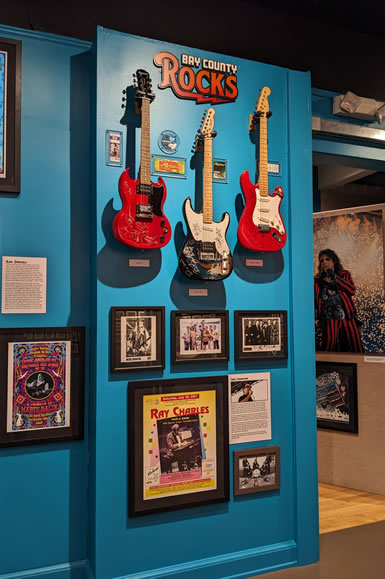“96 Tears and the Schiell Recording Studio” – The subject was the untold story of Bay City’s Official Rock & Roll Song by ? and The Mysterians. It is also the saga of Art Schiell, the Bay City hair dresser who operated a small studio in his home on Bay City’s west side and produced a wide variety of music that also included the first two songs ever recorded by the singer Meat Loaf.
“Madonna Misconstrued in Bay City” – This presentation blew the lid off the two controversies that served to sully Madonna’s reputation in the city of her birth by exposing the hypocrisy of both the former mayor, who used the singer for political gain, and the writer from the Bay City Times who took her words out of context to create an imaginary insult in order to boost circulation.
“The Boy Who Shot Buddy Holly (in color)” – Tom Cederberg, a twelve-year-old Bay City boy, took his 8 mm movie camera to an Alan Freed show at the Flint I.M.A. in 1958 and captured the only color footage ever taken of Buddy Holly and The Crickets performing in the United States. Tom’s film was later borrowed by Paul McCartney for a Buddy Holly documentary that was produced in England.
“The Battle of Mickey’s Big Bop” – Mickey Higgins ran the Big Bop, Bay City’s first teen dance club. It opened in 1957 and was located in a small second-story hall on Midland Street. Two years later, the club closed after its dance license was denied, largely because of an inflammatory letter written by a prominent and powerful member of the community. Dr. J’s presentation revealed the near-tragic event and the family secrets behind the letter as well as the legal and political maneuvers that led to the club’s undoing.
“The Fake Zombies Scandal” – In the late 1960s, Bay City promoter Bill Kehoe hatched a plan to put two bands on the road purporting to be The Zombies from Great Britain. The city’s biggest rock and roll scandal involved future members of ZZ Top as well as musicians from a popular band from Marquette, Michigan. The fascinating scheme was exposed in a front-page story in Rolling Stone magazine in 1970.
“Frankie Lymon’s Tombstone Blues” – Frankie Lymon was rock and roll’s first young star. Sadly, his career collapsed after he was separated from his group, his voice changed, and he acquired a heroin habit. Following his death, Lymon was buried in an unmarked grave. Funds were later raised for a suitable marker, but it was never placed on his grave because of a famous court case involving his three former wives. Dr. J presented all the captivating facts, including the engrossing story of how the tombstone was acquired by the Historical Museum of Bay County.


